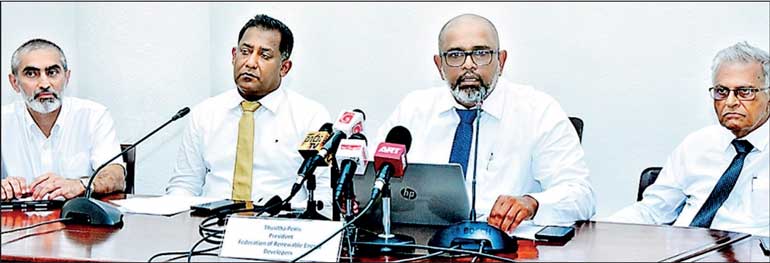Monday Feb 23, 2026
Monday Feb 23, 2026
Wednesday, 2 April 2025 00:00 - - {{hitsCtrl.values.hits}}

The Federation of Renewable Energy Developers (FRED) yesterday sounded the alarm over a looming crisis sparked by the proposed new tariff system awaiting Cabinet approval. With 150 to 200 projects stuck in limbo, FRED warns that if progress stalls, the Ceylon Electricity Board (CEB) could face annual losses exceeding Rs. 13 billion.
Speaking to the media, FRED Chairman Thusitha Peiris highlighted one of the most contentious aspects of the proposed agreement is a clause allowing the CEB to unconditionally limit the intake of electricity from renewable projects into the national grid.
He criticised this provision, warning that it undermines investor confidence and discourages expansion in the renewable energy sector.
“The ramifications of these stalled projects extend beyond the industry itself,” he said.
Peiris revealed that if 300 MWs of renewable energy is lost due to the tariff policy, it would mean a reduction of over 500,000 units of electricity in the national grid next year. “To compensate for this shortfall, the CEB would have to rely on coal-based power, which would cost an additional Rs. 13-15 billion annually,” he opined.
Peiris said that even solar power projects under Piyasa, though not affiliated with the federation, are in jeopardy due to the new tariff structure.
“Around 1,000 companies working on Piyasa solar power initiatives have already invested Rs. 2 billion in equipment, but the uncertainty surrounding the tariff changes could force them to halt operations, leading to financial losses and possible closures. As a result, companies may have to downsize their workforce, putting thousands of jobs at risk,” he pointed out.
He further noted that around 10,000 rooftop solar power projects currently operating under Piyasa may struggle to remain viable.
Peiris explained that solar power projects built on the ground, which generate between 1 to 10 MWs of electricity, present a significant business opportunity. However, the proposed tariff changes threaten their economic feasibility.
“Investors had initially committed to these projects based on a tariff rate of Rs. 24 per unit, but if the Cabinet of Ministers approves the new rates, it will drop to Rs. 19 per unit, marking a 25% reduction. This drastic cut would render many projects financially unsustainable,” he warned.
Noting that financing is another major concern, Peiris emphasised that it is already challenging to secure bank loans at 9% interest for a seven-year period, let alone at the proposed 9.9% for 10 years.
He argued that even a 2% increase in interest rates makes investment impractical. The new policy links energy project funding to 10-year Treasury bill rates, which Peiris questioned as an unattractive investment strategy.
The renewable energy sector has long been considered a key solution to Sri Lanka’s energy crisis, reducing dependence on expensive fossil fuels while promoting sustainability. However, with unfavourable tariff revisions, stalled projects, and financial roadblocks, the sector is now at risk of stagnation.
Peiris urged policymakers to reconsider the tariff structure to avoid jeopardising the country’s renewable energy ambitions, cautioning that if these issues are not addressed, the transition to a sustainable energy future could be significantly delayed.